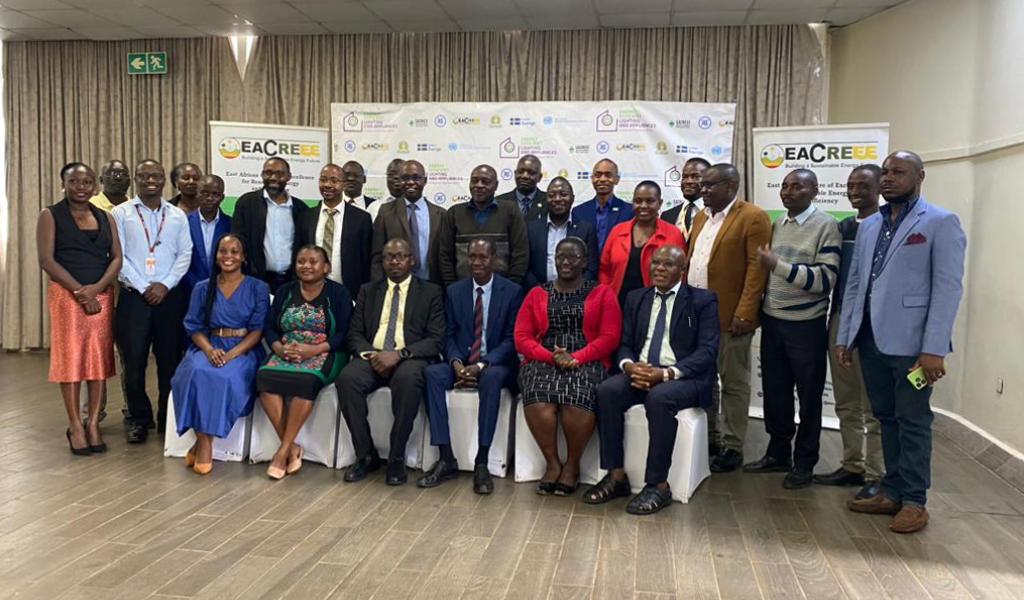News
EELA National Workshop Brings Uganda’s Stakeholders Together for Energy Efficiency Action

On 30 October 2025, the EELA Program in partnership with EACREEE convened its National Stakeholder Workshop for Uganda, bringing together government representatives, private sector actors, and development partners to accelerate the country’s energy efficiency transition. The event focused on strengthening awareness, building capacity, and reinforcing enforcement mechanisms for energy efficiency policies, standards, and their integration into public procurement.
Canon Goddy Muhanguzi, Executive Director of EACREEE, opened the workshop by emphasizing the urgent need for greater investment in energy efficiency to complement ongoing efforts in electricity access. He noted that with Uganda’s population projected to double by 2050, efficient energy use is critical to easing pressure on energy resources and reducing the need for costly new power generation. He further highlighted EELA’s contribution in supporting the development of the EAC Regional Energy Efficiency Policy, Regional Compliance Framework, and Minimum Energy Performance Standards (MEPS)—key tools that will guide sustainable energy transitions across the region.
Strategic Policy Alignment and Ambitious Targets
Dr. Brian Isabirye from the Ministry of Energy and Mineral Development (MEMD) emphasized Uganda’s commitment under the National Development Plan IV (NDP IV) to reduce energy losses to 15% by 2030. He highlighted that achieving this goal requires not only technical measures but also widespread awareness and adoption of the newly approved EAC Regional Minimum Energy Performance Standards (MEPS) for cooling appliances. These standards are expected to harmonize efficiency requirements across the region, creating a level playing field for manufacturers and importers.
Regional Collaboration and Global Support
Mr. Bruno Otto, UNIDO Country Representative in Uganda, praised the Government of Uganda and the Government of Sweden (Sida) for their continued support to the EELA Programme. He noted that EELA’s implementation across EAC, SADC, and ECOWAS reflects a broader vision: promoting energy efficiency as a lever for poverty reduction and environmental sustainability. This regional dimension ensures that Uganda benefits from shared experiences and best practices, while contributing to collective progress.
Learning from Regional Leaders
Mr. Denis Ariho, Lead Technical Expert for EELA, presented ongoing achievements and urged Uganda to draw lessons from neighbouring countries that have advanced in implementing energy efficiency measures. His call for knowledge exchange underscores the importance of benchmarking and adapting successful models to local contexts.
Compliance and E-Waste Management
Mr. Collins Owuor from EACREEE introduced the Regional Compliance Framework developed under the previous EELA phase, encouraging participants to integrate and monitor these practices in daily operations. He also spotlighted E-Waste Management Guidelines, which aim to ensure sustainable disposal and recycling of end-of-life appliances.
Public Procurement as a Game-Changer
Ms. Robinah Auma, Project Assistant at EACREEE, stressed that government procurement can significantly influence market transformation. By embedding energy efficiency criteria in procurement processes, Uganda can drive demand for efficient products and set an example for private sector actors. She shared guidelines developed under the earlier EELA phase to support this integration.
Standards and Policy Development
Mr. Jowad Mubatsi, from the Uganda National Bureau of Standards (UNBS), outlined ongoing efforts to initiate a national policy aligned with regional frameworks. Ms. Musiime Emmer Rava reaffirmed the ministry’s strategic direction and pledged continued government support to the EELA Programme, signalling strong institutional commitment.
The workshop underscored that Uganda’s energy efficiency ambitions hinge on practical implementation of standards like MEPS, leveraging public procurement as a market driver, and embedding compliance and circular economy principles into everyday operations. Regional collaboration and knowledge exchange emerged as critical accelerators, ensuring that policy commitments translate into measurable impact.a